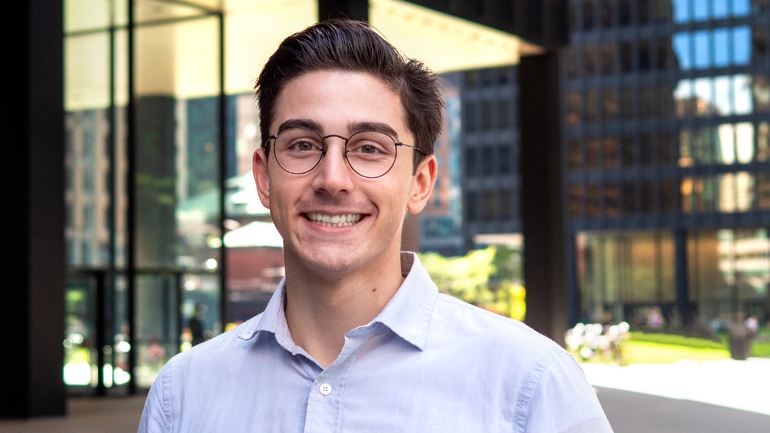Anthony Spezzano joined the Capital Markets Risk Management group at TD in 2017 at the age of 22. A recent graduate with a degree in Cognitive Science, Spezzano was keen to turn his problem-solving abilities into meaningful employment.
As someone with autism, Spezzano was concerned that he might struggle to find a workplace where his skills would be fully utilized. He quickly discovered that the typical recruitment process didn't provide him the opportunity to present himself in the best way to potential employers.
While it's clear that workplaces of the future need to access more diverse pools of talent to thrive, the question is how can they become more accommodating and inclusive?
In a conversation with the TD Newsroom, Spezzano shares his thoughts on his own employment experience and how organizations can work to improve their recruitment process.
Q: You were diagnosed with autism at age 20. What impact did this diagnosis have on your life?
A: It was totally eye-opening, like being given the answer to a riddle. Sure, there was an external bias I needed to be aware of as a result but there was also a personal catharsis involved with gaining an understanding of my behaviour.
I was raised in numerous foster homes in about a dozen cities and attended half a dozen schools. I had been given so much advice over the years on how to alter my emotional and behavioural make up and how to correct my academic performance but there had never been any indication that I was on the autism spectrum. The diagnosis removed the mystery from what I was experiencing.
Q: Did you have concerns when seeking employment opportunities after graduation?
A: I was worried I might not be rewarded with meaningful work. It's assumed that individuals always need to adapt to the working environment and the roles required of them, and never the other way around. Fear of settling, unutilized ability, and/or the need to frequently compromise was discouraging to me, but I still applied myself. I excel with clear details, frameworks and technical parameters. One concern I had with disclosing my autism was whether the workplace could accommodate my needs. It's not that I am incapable of adapting, but it is much easier if the workplace also adapts to the individual to better use their aptitude.
Q: Did the job interview process for TD differ from any previous interview experiences you've had?
A: When applying for a job you must consider if you can sell yourself in the interview setting. For example, is it a panel or one-on-one or over the phone? I might not be the most comfortable in some scenarios, but I might be more comfortable in others. Because TD is committed to sourcing diverse talent, it works with Specialisterne – an organization that helps companies hire individuals on the autism spectrum. That meant I was offered a tailored application process that considered my neurodiversity. The potential role offered to me also complemented my abilities.
Q: Can you tell us more about the interview process?
A: The process with Specialisterne focused on capturing my aptitudes. My behaviors were isolated in a controlled environment where stimuli, both new and familiar to me, were monitored by Specialisterne and my reactions were gauged. For example, my attention span and cognitive flexibility were measured during a workshop where I was given plastic building blocks, a programmable robotics kit equipped with sensors, and a laptop. Using these toys and technology I was asked to create and solve problems such as programming an autonomous car robot. All of these tasks helped to assess my fit within possible work roles. For the first time in an interview, I didn't feel overlooked.
Q: What has your experience at TD been like to date?
A: Before I started I felt a little anxious about whether I would be accepted. But I need not have worried. There's an ecosystem here of integrity and inclusion that extends beyond your immediate working group. While there are some work groups where you may witness this more and others less, the guiding principles of this organization are, in my opinion, golden. Add to that a management approach that is emotionally intelligent and I find that there's a real opportunity here to grow and learn.
Q: What are a couple of things organizations can do to better the recruitment process for people on the autism spectrum?
A: Creating an environment where unique individual needs are considered as part of the process is imperative. Showing you're an organization that offers accommodation, while demonstrating adaptability, can help make you an incredible ally. The organizations of the future will be built around helping to create the best working conditions for many kinds of diversity, including diversity of thought.
Q: Is there anything else about autism and the workplace that you think is important for people to know?
A: Being diagnosed with autism was huge for me and revealed to me how little people know and how unprepared they are to be allies for those on the autism spectrum.
I'd suggest every organization should work towards dedicating as many resources as possible that go beyond just awareness of the autism spectrum. There needs to be true engagement in hiring and working with people on the spectrum to be better equipped to fully harness their strengths in the workplace.
To learn more about Specialisterne (either as a business or as a candidate), visit: www.ca.specialisterne.com
